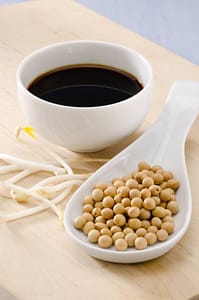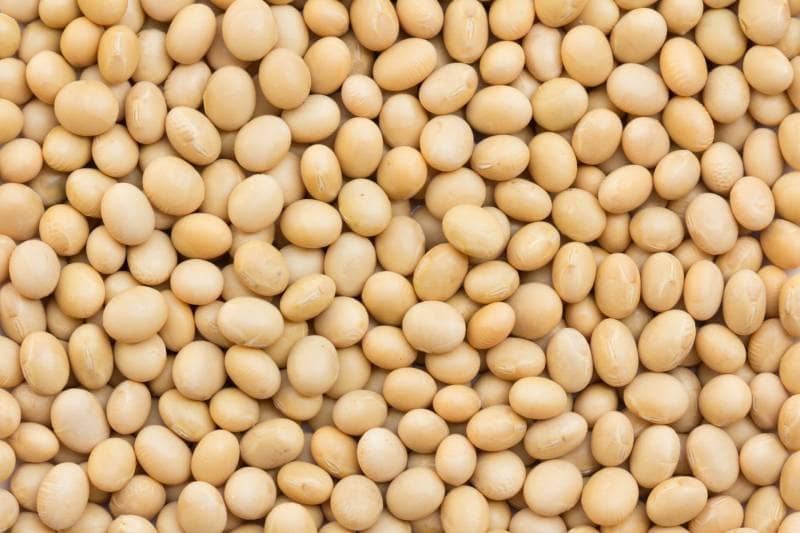Vegan Globetrotter is supported by our audience. When you purchase through one of our links, we may earn a small affiliate commission. As an Amazon Associate I earn from qualifying purchases. Your cost is not affected.
==================
Is Soy Bad For You Or Not?
One of the burning questions on people’s minds is: “Is soy bad for you?” For years, soybeans have been a part of vegan and vegetarian daily meals. Asians started consuming them thousands of years ago. Americans even made burger patties from them. So it’s safe to say that, a long time ago, people came to consider this veggie as food to live on.
Yet is soy as healthy as people claim it to be? Are there risks associated with having plenty of it? There seems to be a lot of conflicting data out there that make it challenging to find out the truth. Hence, it’s not surprising why folks continue to make the safety and worthiness of soy their topic.
In this post, we’ll check the benefits and drawbacks of this plant-based food. That would be to determine whether it’s healthy for you or otherwise. We’ll have a look at the evidence on the said vegetable and see its general effects on health. Continue reading to learn more.
Why Is Soy Bad For You? People Opinions
Is soy safe to eat? It’s likely very safe for human consumption. People, in general, have been including soybeans in their diet for centuries. In fact, some of the healthiest people today, such as those in the Blue Zones, enjoy soy frequently. Even if humans only take in about 6% of soy products made in the world, it proves that people make it a part of their meals. Examples of edible things from it are tofu, soy sauce, edamame, and tempeh. People who can’t take in dairy products even have plant-based milk from it. Yet, due to the phytoestrogens in the isoflavones included in soy, some disparage it. The natural plant compounds in the soybeans mimic the action of estrogen somehow. Thus several individuals find it intimidating to enjoy soy-based products.

Is soy good for you?
In its raw, cooked, or fermented form, the vegetable is nutrient-dense. Goods with soy are often high in protein and fiber, low in fat plus carbs, and contain other nutrients. So it’s sensible why vegans incorporate it in their breakfast, lunch, snacks, and dinner. In that way, is soy healthy? We can say that it is because it has beneficial elements to keep a person in good condition. As long as you only have about 4 servings or 25 grams daily, it’s not at all bad for you. There would only be serious issues with repeated excessive intake.
Why People Prefer Soybeans
Soybeans are legumes that many vegans and vegetarians consume weekly or even daily. They use these beans as their source of nutrients because they usually come with plenty. Is soy safe to eat? With the right preparation, it isn’t only harmless but also beneficial. After all, about its nutrition, it comes with a lot of protein and fiber. For instance, 100 grams of uncooked green versions of these legumes give 12.3 grams of protein and 4.2 grams of fiber. Plus, that amount yields only 6.4 grams of fat. Even if lean meat often has more protein, soy spares consumers from bad cholesterols. So it helps prevent cardiac problems such as heart attacks.
It does take hours to cook soybeans, but at least it gives unique flavors. Eating cooked beans yields a combination of umami, slight sweetness, and some bitterness. Plus, products made from soya beans are usually inexpensive. Thus veggie burgers, plant-based milk, and condiments from soy are healthy and easy to find. It makes them a great choice when dieting or starting a healthy lifestyle.
Is Soy Bad For You To Eat Raw?
In most cases, eating uncooked soybeans results in gut problems. After all, they come with phytic acid that reduces or even stops nutrient absorption. Iron, zinc, and calcium don’t get absorbed as much with it present. Also, raw soya has enzyme inhibitors that affect digestion and metabolism. Such affects protein and mineral intake. So is soy good for you to cook? Without a doubt. Soaking, cooking, and fermenting help break down the phytic acid and biological catalysts. Thus processing soybeans is essential for safety.
Is soy safe to eat? It gets digested better when cooked. The passage in the stomach and even intestines turn faster with the heated beans. Heating inactivates the lectins which usually causes allergy and gastric upset too. Uncooked soy causes slow passage and insoluble residues in the said organs. In that way, it isn’t strange at all for the intake of raw soya to result in gut issues, and why people are careful with soya. Such may produce indigestion, feelings of bloatedness, and constipation. Weak nutrient absorption from poor digestion may manifest other symptoms too. Hence, experienced consumers often recommend heating or fermenting before eating.
With Health Issues, Is Soy Bad For You?
The answer depends on what condition you are suffering from. For instance, if you have a painful kind of arthritis called gout then you may need to control your soy intake. Although soybeans have average purines, excessive intake leads to high uric acid levels. It may not be a great idea to have soy when having hyperacidity. Despite soya being alkaline, the stomach digests it using the enzyme called pepsin. In turn, this worsens the acidity of your insides. With these things in mind, you may still be wondering, “Is soy healthy?” Yes, it remains a nutritious food. With the right dieting, it is helpful.
Even if it has phytoestrogens, is soy safe to eat? Despite containing isoflavones, it is innocuous. According to the European Food Safety Authority, soy foods won’t harm postmenopausal women. Also, with other studies, evidence shows that isoflavones don’t alter bioavailable testosterone concentrations. So there should be no issues with the secondary sexual characteristics in men. It’s not true that feminizing effects come with vegetable intake. Likewise, concerns about its intake arose because of animal studies. That is even if there is research to show the safety and good of soy products. So be cautious of it only when you have preexisting conditions that may worsen after taking it in.
Check Some Soy Products
What is the best one and is soy bad for you? As long as it’s not contraindicated in your diet, you should have no issues consuming soya beans. But, in having some, you have the option to choose between different kinds. Also, it’s not enough to select one at random. After all, these products have unique attributes. Thus, in picking what to have, you may want to familiarize yourself with what you can select.
Edamame
This is a young or immature soya bean that is often still in a pod and folks use it in Asian cuisines. Having a mix of green and grey hues, its flavor resembles the taste of peas. Yet it has some sweetness and nuttiness to it. Now, with this version, is soy safe to eat? Yes, but heating may be necessary. It’s only because cooking it will get rid of what makes it difficult to absorb nutrients and digest. Usually, boiling for a few minutes does the trick. This approach is oftentimes better than steaming and microwave cooking. People choose this type of soy due to its high protein and fiber levels. Also, it doesn’t have cholesterols. So it appeals to people who want to build muscle, has good digestion, and have a plant-based protein source.
Soy Milk
Is soy bad for you? If you’re not allergic to legumes then the liquid from soaked and ground soybeans may be great for you. Soy milk is a good alternative to dairy milk because it kind of tastes like it. Plus, it’s usually available in chocolate and vanilla, plus is dense with nutrients. Fortified versions have calcium and vitamins but regular ones are somehow as good. It is free of cholesterol and has a low saturated fat content. Instead of bad cholesterol, this product is rich in omega-3 fatty acids that are good for the heart. It also doesn’t contain lactose that causes inflammation and irritates the bowels. Still, its protein and amino acids are almost the same as cow’s milk. Thus many continue to buy batches and support its production.
Soy milk can be made at home quite easily and for a fraction of the cost of store bought.
Tofu
Often termed bean curd, this creamy food that is available in block form is quite firm and nutritious. Like other soy products, it also contains high amounts of protein and is low in fat.
Are you looking for something filling and is soy good for you? Folks use this form of soy as a meat alternative. Cooking usually involves baking or frying for about 25 to 30 minutes. What makes it unique is that it can absorb spices. Hence, folks apply marinade on it for better flavor.
We prefer to freeze our tofu before using it. This gives it a bit more chewy texture. Of course, if the goal is a pudding filling, use a softer texture and don’t freeze first.
Tempeh
This fermented form of soybean product offers extra health benefits. After fermentation, it is pressed into a flat cake, then used as a protein.
Tempeh offers a dry, firm, and chewy texture with a slightly nutty taste. Use it steamed, sautéed, or baked. Recipes often recommend marinating it to add more flavor.
The Benefits of these products include:
- Improving your cholesterol.
- Lowering your blood pressure.
- Protecting your heart.
- Improving insulin resistance.
- Lowering inflammation.
- Helps relieve hot flashes from menopause.
- Promoting bone health.
What’s not to like?
The Bottom Line
Ask yourself, “Is soy bad for you?” The answer isn’t as complicated as some might think it to be. With moderate intake, it’s likely harmless. Those eating plant-based food like vegans aren’t the only ones enjoying it. Folks with health conditions and fitness goals can also try soy products. When cooked or fermented, they are healthy and tasty. These can be protein substitutes for meat. Still, they make valuable sources of vitamins and minerals. So is soy healthy? Yes, and people have proven so for years.
They may be nutritious, but it pays to be cautious when consuming them. No conclusive evidence of phytoestrogens being dangerous exists. Yet their being in soy gives a bit of risk to consumers. With this in mind, have only a reasonable amount of natural or processed soya beans for safety. After all, skipping it means missing out on the healthy stuff too.
Did any of the points earlier help you know soy better? Did this post help you find out if soy is safe to eat? Let us know in the comments. Thanks for reading.
Read More
Will Eating Soy Increase My Risk Of Breast Cancer?
What Foods Are Most Nutritious Raw?







Don't miss out
when new recipes and information are added!
Join our newsletter for free recipes,
healthy living inspiration, and special offers
You have Successfully Subscribed!